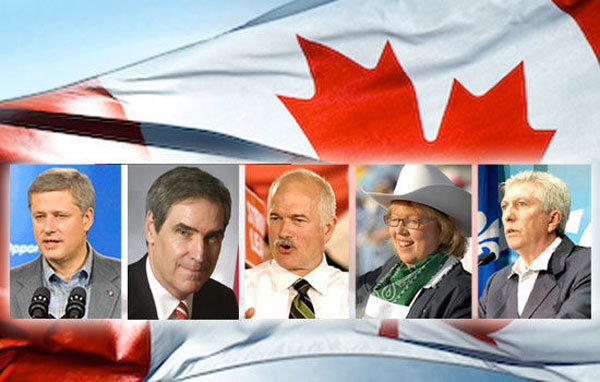OTTAWA - Stephen Harper has sealed his place in the history books, winning a Conservative majority to ensure four uninterrupted years of power and a seat in the Tory pantheon.
Aided by an ascendant NDP that helped split the vote, Harper won his first majority after two successive minority governments that many pundits and pollsters wrongly believed marked a glass ceiling for the former Reform party founder.
In the process, Harper also delivered an historic defeat to Canada's once "natural governing party," as Michael Ignatieff's Liberals tumbled to third place in the seat standings behind the NDP.
The New Democrats rode a mid-campaign surge of support to an orange revolution of sorts, becoming Canada's official Opposition for the first time and almost tripling their representation to over 100 seats.
Harper joins Canada's first prime minister, Sir John A. Macdonald, and 1950s-era John Diefenbaker as just the third Conservative ever to win three consecutive elections.
What most public opinion polls had suggested would be a nail-biter of an election was over by the time it hit Ontario's western border. The Conservatives were en route to winning 40 per cent of the popular vote, with the NDP at 31 per cent and the Liberals at 20.
The rise in NDP fortunes contributed to vote splits favouring the Tories, especially in Ontario where the Liberals were decimated in their last national stronghold.
Ignatieff appeared poised to lose his own Toronto seat in Etobicoke-Lakeshore, ensuring he won't be around to lead the Liberals when Canadians next go to the polls October 2015 under Harper's fixed election date law.
The redrawing of Canada's electoral map didn't end there.
Bloc Quebecois Leader Gilles Duceppe, whose own seat appeared in jeopardy, saw his party reduced to a small regional rump — the first time since 1993 that the separatist party hasn't claimed at least half Quebec's 75 seats.
Harper's Conservatives were the undisputed winners.
The Conservative run started in Atlantic Canada, where the Tories overtook the Liberals in the popular vote and added three of the 12 additional seats needed to ensure solid control of Parliament.
The Liberals emerged from the Maritimes scarred but alive, having dropped two seats to the New Democrats and three to the Conservatives. The Tories picked up one seat by a razor-thin margin in Newfoundland and Labrador after being shut out in the last election.
A fractious campaign that began slowly in the last week of March turned into a ground-churning, two-horse race to the finish.
A buoyant Harper cast his ballot at an elementary-junior high school in his Calgary Southwest riding, with wife Laureen and their two children at his side.
Layton and his Liberal rival, Michael Ignatieff, both voted in their Toronto ridings earlier in the day, reflecting what is expected to be the most significant dynamic of the national ballot.
Ignatieff, the subject of more than a year of negative Conservative advertising going into the 36-day race, proved to be a game campaigner but his anti-Harper call for change appeared to benefit Layton.
The NDP surged to unprecedented levels in Quebec after the leaders' debate and appeared to gain momentum across Canada in the last two weeks of the campaign.
Layton voted in his Toronto Danforth riding accompanied by his wife, incumbent New Democrat Olivia Chow, along with his mother-in-law, daughter and granddaughter.
Ignatieff shook hands as he arrived at a polling station in a junior high school in suburban Etobicoke, trailed by news media. He appeared a bit on edge and after slowly inserting his ballot in the box, he got on the bus and waved to the cameras.
Later, he and wife Zsuzsanna Zohar visited a nursing home. The Liberal leader said it "feels great" to vote after the rigorous campaign.
Bloc Leader Gilles Duceppe cast his ballot in the morning in the Montreal riding where he's believed to be fighting for his own seat.
And in the British Columbia riding of Saanich-Gulf Islands, Green Leader Elizabeth May was looking to defeat Tory cabinet minister Gary Lunn.
May focused virtually her entire campaign on the riding in her attempt to gain a voice inside the House of Commons. Insiders suggest the race is too close to call.
Depending largely on those vote splits, the Conservatives appeared to be on the cusp of their first majority since Harper initially took power in January 2006.
Just 58.8 per cent of eligible voters cast a ballot in the 2008 federal election, the lowest in Canadian history.
However, voters turned out in record numbers for early balloting on Easter weekend, leading some to speculate that an election derided as unnecessary by the governing Conservatives has generated amply public interest. ![]()
Read more: Politics, Federal Election 2011, Elections















Tyee Commenting Guidelines
Comments that violate guidelines risk being deleted, and violations may result in a temporary or permanent user ban. Maintain the spirit of good conversation to stay in the discussion.
*Please note The Tyee is not a forum for spreading misinformation about COVID-19, denying its existence or minimizing its risk to public health.
Do:
Do not: